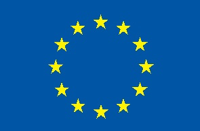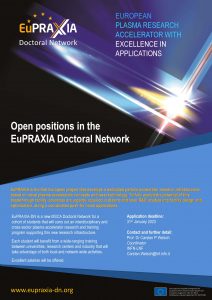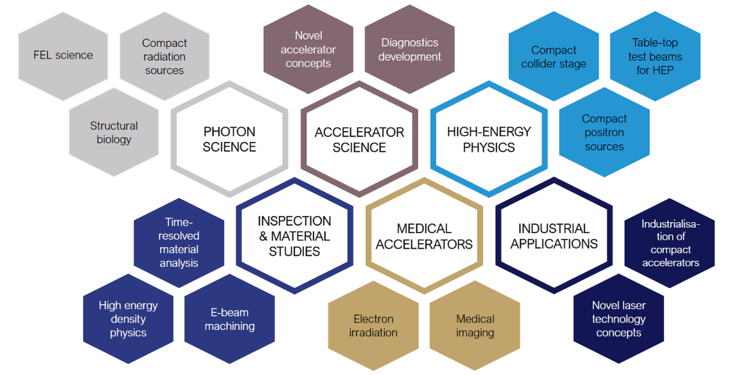High level fellowships will carry out an interdisciplinary and cross-sector plasma accelerator research and training program for the new EuPRAXIA research infrastructure.
The EuPRAXIA Doctoral Network (EuPRAXIA-DN) is a new Marie Skłodowska-Curie Actions Doctoral Network (MSCA-DN) offering 12 high-level fellowships between universities, research centres and industry that will carry out an interdisciplinary and cross-sector plasma accelerator research and training program. The network will start on 1 January 2023 and benefit from more than 3.2 M€ of funding over its 4-year duration.
Several tens of thousands of particle accelerators are in use today with varied applications in research, industry, medicine and other fields. Yet accelerator usage could be much more widespread, were it not limited by cost and size constraints, especially in hospitals, universities, and small and medium size companies. This would enable ground-breaking applications and innovations on a much larger scale.
A possible solution to this bottleneck is the development of more compact – and consequently more cost-efficient – accelerator technologies, a strategy that has been investigated in the past two decades bringing forth plasma accelerators as one of its most promising candidates.
EuPRAXIA is the first European project that develops a dedicated particle accelerator research infrastructure based on novel plasma acceleration concepts and laser technology. It focuses on the development of electron accelerators and underlying technologies, their user communities, and the exploitation of existing accelerator infrastructures in Europe. It was accepted onto the ESFRI roadmap for strategically important research infrastructures in June 2021 as a European priority.
Expected impact of EuPRAXIA on different fields. (Image credit: EuPRAXIA)
To fully exploit the potential of this breakthrough facility, advances are urgently required in plasma and laser R&D, studies into facility design and optimization, along a coordinated push for novel applications. EuPRAXIA-DN will focus on scientific and technical innovations and on boosting the career prospects of its Fellows. The project comprises a lot of the European expertise in this research area and involves 10 universities, 6 national and international research centres, as well as 7 partners from industry at project start.
Scientific Coordinator Prof Carsten P Welsch, University of Liverpool/Cockcroft Institute and INFN-LNF, said: “I am absolutely thrilled that this new Doctoral Network was selected for funding in such a highly competitive scheme. Plasma accelerator research is at the cutting edge of technology and our Fellows will carry out R&D in a highly interdisciplinary field that shows great promise for scientific discovery and technology innovations.”
EuPRAXIA-DN’s main scientific and technological objectives are split into three closely interlinked work packages. The first one will tackle an overall optimization of the accelerated electron beam by carrying out comprehensive studies into the best laser and plasma parameters. A second work package targets studies into the design and optimization of laser- and beam-driven plasma accelerator facilities, specifically through the development of superior beam diagnostics and synchronization technologies as required for optimum beam quality. Finally, network partners will join forces to enable breakthrough science measurements and innovative applications.
INFN is the Italian research institute aimed to the study the fundamental constituents of matter, which conducts theoretical and experimental research in the fields of sub-nuclear, nuclear, astro-particle and particle accelerator physics. In the last 10 years an important effort towards the realisation of a plasma driven FEL facility is underway at the EuPRAXIA test facility named SPARC_LAB located at the INFN Frascati Laboratories near Roma. During Summer 2021 the first demonstration of SASE and Seeded lasing of an FEL driven by a PWFA module has been achieved at SPARC_LAB and published by Nature. The SPARC_LAB test and training facility is also expected to enable in the next 5 years to establish a solid background in plasma accelerator physics and to train a young generation of scientists to meet all the challenges addressed by the EuPRAXIA project. “Femtosecond synchronisation is a fundamental requirement to enable a plasma driven FEL facility to provide users with stable photon flux.”, said Dr. Marco Bellaveglia, PhD supervisor, “and a deeper understanding of the Plasma Formation in Capillary Discharge Waveguides will enable improving the electron beam quality at the plasma exit” , add Dr. Angelo Biagioni, PhD supervisor. “ Both these challenges we expect to address and solve at the SPARC_LAB facility in the framework of this Doctoral Network”, concludes Dr. Massimo Ferrario, head of the SPARC_LAB facility.
10 Fellows will be funded from the Horizon Europe MSCA-DN funds, and 2 additional Fellows will be funded by the UKRI guarantee funds. All students will be enrolled into a structured PhD program and benefit from a combination of local and network-wide trainings within EuPRAXIA-DN. This includes courses at the different host institutions, alongside network-wide trainings which will be made available to the wider scientific community. Excellent salaries will be offered. The application deadline for all positions is 31st January 2023.
More information can be found on the network’s homepage:
 This project has received funding from the European Union’s Horizon Europe research and innovation programme under the Marie Skłodowska-Curie grant agreement No 101073480 and the UKRI guarantee funds.
This project has received funding from the European Union’s Horizon Europe research and innovation programme under the Marie Skłodowska-Curie grant agreement No 101073480 and the UKRI guarantee funds.

2 Fellows will be funded by the UKRI guarantee funds under project EP/X027112/1.
 INFN-LNF Laboratori Nazionali di Frascati
INFN-LNF Laboratori Nazionali di Frascati

